Premium Agrochemicals Limited is one of Nigeria’s prime conglomerates, which has intensified efforts in expanding its operations rapidly in the country’s fully integrated rice value chain. PAL, in collaboration with AICL Specialty Fertilizer, has been persistently facilitating the actualization of the Federal Government’s campaign and mandate of actualizing the “Nigerian Rice Revolution.” Monday, 22nd June, 2020, marked yet another epoch-making day, as the management of Premium Agrochemicals Limited International (PAL) organized its second Farmers’ Field Day, which had as its theme, “Response of High Quality Magic Fertilizers versus Conventional Fertilizers towards Rice Productivity and Quality in Northern Nigeria.”
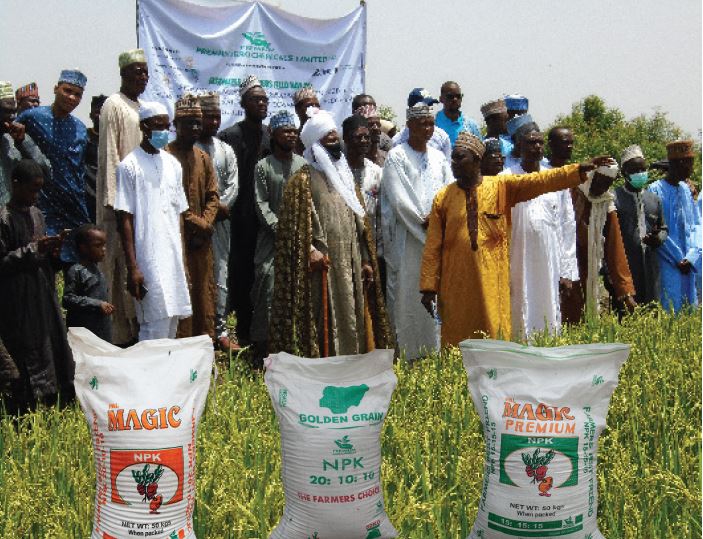
The rationale behind the seminar was to unveil the company’s milestones over the years, as well as showcase its major activities aimed fundamentally at supporting and accelerating the Nigerian government’s strenuous efforts towards attaining colossal rice revolution and integrated value chain within a short time pace in the country. The seminar, which formally commenced with an opening prayer by the representative of Kano State Agricultural and Rural Development Authority (KNARDA), Alhaji Yakubu S. Rahma, was proficiently and seamlessly coordinated by Professor Ambassador Musa Tukur Yakasai (Consultant to PAL). The opening prayer was immediately followed by introduction of guests and special guests of honor at the event by Professor Yakasai. The event had recorded impressive attendance (over thirty attendees/participants). In his welcome address, the coordinator of the event and consultant to PAL, Professor Yakasai, had thrilled the audience by divulging the company’s groundbreaking feats in the past, the present and the future, which he reiterated, were “all committed to the overall benefit of Nigerian farmers and the populace.” “The Federal Government has developed a programme aimed at intensifying rice production in the country, and all stakeholders, including ministries of agriculture, agricultural agencies, research institutes public and private organizations have been urged to support its actualization.
It is in view of this programme that a new company, Premium Agrochemicals Limited (PAL), has mandated us to assemble a team of agricultural scientists, extension service workers, experts in different fields of agriculture, lecturers of agricultural courses, and institutes of agricultural research to attend this event in order to further confirm to participants the efficacy of the Premium Agrochemicals Limited High Quality Magic Fertilizers and their superiority over conventional fertilizers.
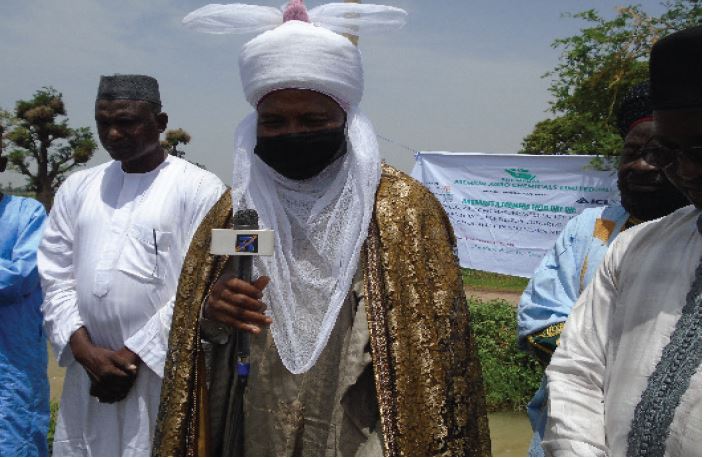
Basically, there are two types of fertilizers – inorganic and organic fertilizers. The organic and conventional fertilizers are usually applied to crops (two to three times) only when they have grown to certain stage, but for the Premium Agrochemicals Magic fertilizers, application and sowing of seeds are done almost simultaneously. And they are applied just for once; not in repeated doses of two or more unlike the conventional ones. This technology is new here in Nigeria, but its adoption and practice has gone far across the globe. Foreign nations like India, France, United Kingdom, Brazil, America, and Senegal (in Africa) have adopted this technology. Therefore, Premium Agrochemicals Limited decided introducing this revolutionary technology to the country to measure its degree of efficacy and suitability to our soils. We have three demonstration farms – one at Dakasoye, one at Warawa near Wudil, and this one here in Gafan.
Each of these farms is further divided into eight portions containing different brands of conventional fertilizers, which serve as control for the experiment, and Agrochemicals Limited High Quality Magic Fertilizers (HQMFs) serve as test samples for the experiment. Repeated experiments and outcomes consistently revealed that HQMFs are by far better than their conventional counterparts. Moreover, similar experiments were conducted here last year, during rainy season, but this time, we deliberately chose to try it out during dry season farming to compare and contrast the efficacy of the slow released fertilizers on rice between rainy season and dry seasons. The three brands of High Quality Magic Fertilizers blended by Premium Agrochemicals Limited are MAGIC 20-10- 10, MAGIC 15-15 15, and Golden Grain 20-10-10. They are highly scientific in their formulation and working mechanisms. And the innovation is primarily made bearing in mind the agricultural economics of farmers – that is, minimizing wastes or losses and maximizing or scaling up farm produce and profits. These fertilizers are technically produced in such a way that, if crops are meant to take one hundred days to complete their lifecycle; the fertilizers will not hurriedly deplete their contents, but rather release them slowly until the hundred days elapse. This is contrary to the conventional ones that rapidly leach their contents into underground water or drowned by surface water even before the fertilizer needs of crops arise, thus profusely starving them of basic nutrients. The HQMFs have undeniably proven their might and superiority vis-à-vis the conventional ones in terms of quality and quantity of crop yield, availability, affordability or cost effectiveness, and the colossal profits they attract to farmers. Obviously, all our discussions here are centered on the losses incessantly incurred by our local farmers and ways to prevent them, and at the same time fathom ways through which their farm produce will accrue more profits for them.
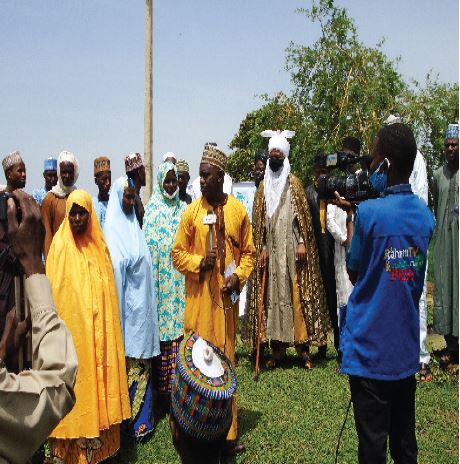
To this end, Professor Yusuf Bala Daraja is, to the best of my knowledge, the only scientist I know, has embarked on a stunning research termed, ‘Rice Intensification Production.’ This system aims at using less energy, less capital and other resources to cultivate rice and gain optimally. Since our local farmers have been habitually toiling with the archaic methods of rice production for centuries without gaining optimally from the enterprise, Premium Agrochemicals Limited has decided inviting and collaborating with Professor Daraja so they could share their wealth of experience and expertise in rice revolution chain programme with farmers and representatives of research institutes present at this event.”
Professor Yusuf Bala Daraja, had during the occasion, explained how his ongoing project termed, “Intensification of Rice Production,” would, if perfectly integrated with the three brands of Premium Agrochemicals Limited Slow Released Fertilizers, turn around the social status and financial fortunes of our local farmers and at the same time increase crop productivity, food security and environmental preservation and protection. His words, “When I was first informed of these High Quality Magic Fertilizers blended by Premium Agrochemicals Limited; fortunately, at the faculty level of the my institution, we are currently undertaking a research on how and why our local farmers use very large doses of fertilizers on farms, but usually end up with poor yields, little profits and great losses on yearly basis.
We had once carried out a research in this area (Kura), Garun Mallam and up to the Bunkure enclave. The research was aimed at determining the concentration of nitrates in the water contained in those wells used by farmers for irrigating their crops, especially rice. The results revealed that the concentration of nitrates in the wells was too high, thus indicating that a larger portion of fertilizers applied on those farms usually got drained into underground water. Research has shown that, if for instance 100kg of fertilizer applied on farm, only 33kg of it is used up by crops, and the remaining 67kg usually gets evaporated into the atmosphere or leached into underground water. By implication, farmers always operate at great loss during fertilizer application on farms – as they waste money purchasing fertilizer, they waste time applying it, and they waste energy and other invaluable resources during the whole process only to end up losing 67kg out of 100kg of fertilizer into underground water.
Therefore, with the invention and introduction of the Slow Released Fertilizers of Premium Agrochemicals Limited, our local farmers will now have a new lease on life, because all this wastage of time, energy, and other resources will cease, and nitrification of underground water too will be tremendously curtailed.
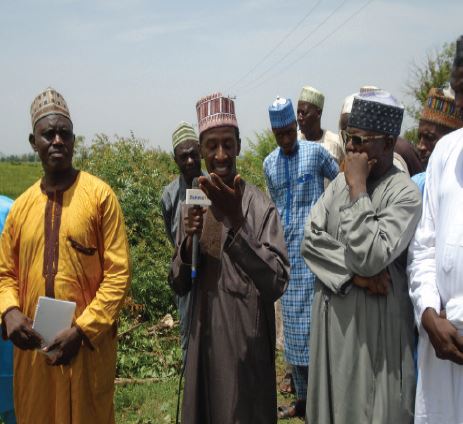
during Farmers’ Field Day
As Professor Yakasai had earlier mentioned, “Intensification of Rice Production” is actually a new system here in Nigeria. It had originally started in Madagascar, but today, other countries like Indonesia and Philippines have graciously embraced the system. It is an entirely different technique from what we practise here. For example, if one is to sow rice on a hectare of land, one is expected to exhaust at least a whole bag of paddy rice for broadcast on the land. But in the system of ‘Intensification of Rice Production,’ only 8kg of paddy rice is required for broadcast on a hectare of land, and it does not require regular water supply or irrigation. It only requires water when the soil gets dried. Also, it does not condone stagnant water within its stem untilit starts flowering or producingseeds. And another good aspect ofit is that, the system produces 8 tonnes of rice output per hectare. Though we are still researching, but from all indications, these High Quality Magic Fertilizers are the most appropriate products for the ‘Intensification of Rice Production’ system. Since it has the mandate for extension services, we are perfecting plans to collaborate with the Kano State Agricultural and Rural Development Authority (KNARDA) in the ‘Intensification of Rice Production’ project here in Kano, to weigh and determine the appropriate system to adopt at the end of the project. In the first place, this system minimizes the cost of production; it curtails the frequency and cost of irrigating rice farm; and environmentally, it minimizes the rate at which well water gets polluted as a result of leached fertilizers into underground water. Therefore, in the next the Dryland farming season, we shall we shall collaborate with Premium Agrochemicals Limited, using solely its brands of fertilizers to test how their contents are absorbed by the soil and their adaptive effects on our soils. What most people have failed to understand is that, the harvests our farmers usually make at the end of each farming season are ridiculously low compared with what is obtained under normal circumstances. This is because our local farmers seldom exceed 2 tonnes or at most 3 or 4 tonnes of rice (for the hard working farmer in Nigeria) per hectare whereas the same hectare of land can produce 8 tonnes of rice.
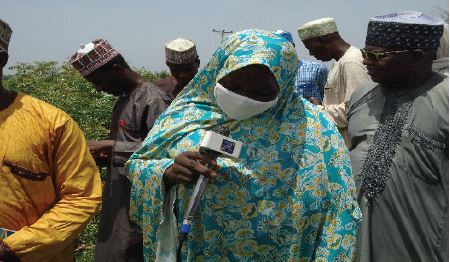
Association, Kura), during Farmers’ Field Day
In Egypt for example, farmers make 8 to 10 tonnes of rice per hectare of land simply because they easily adopt modern farm practices, techniques and technologies, as well as proper farm management practices such as selecting and sowing of viable and disease resistant seeds; supply of the right quantity of water and at the right time; selection and application of appropriate brands of fertilizers and at the right time and in the right quantity, and weeding at the right time; soil nutrient tests prior to fertilizer application, etc. But unfortunately, our so-called successful farmers here usually pride themselves with only 2 tonnes of rice per hectare, and they feel they have made it. We know that 8 tonnes of rice are equivalent to 100 plus bags. Ideally, every hectare of rice farm should produce nothing less than 120 bags of paddy rice. And this is practicably feasible. Yes, we can achieve this feat. Very soon, we shall contact KNARDA to choose major rice producing local governments like Kura, Warawa, and Garun Mallam, et al., to commence experiments on ‘Intensification of Rice Production’ project across Kano State. The rationale behind the project is to point out those areas that most suit the new system.” Professor Ahmad Shuaib, in his remarks, revealed two major predicaments bedeviling rice farmers in the state. “Our local rice farmers are usually faced with two major challenges – pre and post harvests losses. As part of pre-harvest losses, due to lack of modern rice harvesting tools, which expedite the process of harvesting, sometimes rice farmers encounter losses from bush fires that gulp a part or the entire farm due to the activities of hunters of bush rats. I had personally witnessed such ugly incidence in the state recently.
As part of post-harvest losses, when farmers employ human energy for rice threshing, huge amount of irrecoverable money is spent, and wastage of rice grains is usually encountered too. Rice thieves are also a threat because they move from farm-to-farm during night hours, scouting for harvested rice kept in open field to dry up, and still it. Having said all that, the government and stakeholders should provide our local farmers with modern farm machinery like combined harvesters to speed up the process of cultivation and harvesting their crops in order to avert those mishaps mentioned above.” Dr. Nasir Ahmad Abdulkadir (H.O.D, Soil Science, KUST), had during his address, had decried the inability of our local farmers to gain access to soil testing kits,and their lack of knowledge and experience to determine a suitable soil for a particular crop, and even the health of the soil. As a soil scientist, he made it clear that, failure or in ability to determine an appropriate soil and its health before cultivating crops is certainly the beginning of failure at the end of the entire farming process. By the time our local farmers cannot test their soil to determine which soil befits which crop, and the health of the soil; they end up making wrong decisions by applying wrong fertilizers on wrong soils, consequently leading to low crop yield and great losses. Therefore, the government and stake holders should make available farm subsidies and kits for testing soil health, and soil nutrient distribution pattern.”
The District Head of Kura Local Government Area, His Highness Alhaji Abubakar Idris Abubakar, while commending the unwavering efforts of Premium Agrochemicals Limited towards the actualization of Rice Revolution in Nigeria, pointed out that the High Quality Magic Fertilizers produced by Premium Agrochemicals Limited (PAL) would go a long way in alleviating the predicaments of farmers in Kura, Kano State and the entire nation. He reiterated that lack of good timing and proper knowledge of selecting appropriate fertilizer at a time, has been the major bane or impediment debilitating against the success of farmers in the area. He said for Premium Agrochemicals Limited to have three demonstration farms in different locations across Kano State (Dakasoye, Wudil and Gafan), but decided to choose that Gafan (Kura Local Government); it was a clear indication of PAL’s unfettered love for our community and people, and it had the plight of his people at heart. He concluded that the gesture was indeed a selfless act worthy of commendation and emulation by others. He further pledged to convey the message of what he learnt and saw to his people. His words, “Following what I have seen here, I can affirm that the company is selflessly doing this purely for the benefit of our people, not for its gains. Therefore, I shall personally take the bull by the horns to create awareness to our people, as well as charge my village and ward heads with the responsibility of creating awareness to their village and ward members to embrace these fertilizers that are imbued with agricultural revolutionary technology. ” “Once again, it is on this note that I wish to extend my warm appreciation to the management and entire staff of Premium Agrochemicals Limited and organizers of this Farmers’ Field Day seminar, which is very educative and beneficial to our people, and has positive short-term effects in repositioning Nigeria’s economy. Thank you all,” the Alhaji Abubakar Idris concluded.
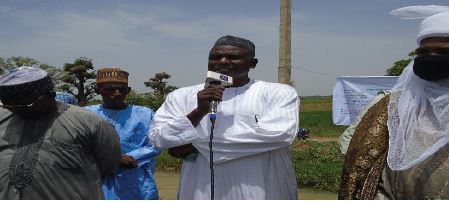
during Farmers’ Field Day
The Women Leader, Kura Local Government Women Farmers’ Association, Hajiya Rahamatu Sale, had in her address acknowledged that female farmers in the area have been perennially faced with a lot of challenges ranging from lack of access to adequate fertilizers to poor information on improved farm techniques. She added that before, the Field Day seminar was organised by PAL, no individual, organisation or fertilizer blending company had ever paid them a visit to create awareness on new farm practices and what type of fertilizer to apply and in what quantity and at what time. Therefore, she had on behalf of members of her association, thanked the management of Premium Agrochemicals Limited for and organisers of the event for coming up with such lucrative initiative of blending and distributing such novel and unparalleled fertilizers in the country. The representative of Sasakawa (alias Hunger Eradicator), Alhaji Idris Saidu Garko, had lamented on the high wave of strange ailments among local farmers nowadays, which he attributed to frequent use of fertilizers alleged to contain toxic substances. “In those days, hardly would you hear or find our local farmers frequently patronizing hospitals seeking for medical attention due to strange sicknesses. But today, the trend has dramatically changed because the prevalence of illnesses of unknown sources among our local farmers is just unbearably so high that one cannot imagine. I am not saying they should not fall sick when it is inevitable, but the rate these days is just too high, and the sources are usually unknown. This is what triggered some scientists and medical experts to undertake different research, and the findings proved that the source of such illnesses may have been from foods cultivated with fertilizers containing toxic substances,” Alhaji Garko stressed. He added further that as his organisation, Sasakawa, is fondly referred to as Hunger Eradicator, the battle against hunger in the Kano State and the entire nation is being gradually but surely won in all fronts. For instance, he cited the adoption of modern farming techniques and use of specialized fertilizers such as PAL’s High Quality Magic Fertilizers (Magic 20-10-10, Magic 15-15-15, and Golden Grain 20-10-10) as ways of eradicating hunger in the country.
“If a farmer cultivates rice on a small piece of land, with proper farm management such as adopting proper farm management and application of Premium Agrochemicals Ltd Magic fertilizers; I hope, he/she should make nothing less than 20 to 40 bags of paddy rice. At least, this should be able to sustain a single family household,” Alhaji Garko added. “Our job principally is to tap from the stunning findings of research and agricultural organizations or companies like Premium Agrochemicals Limited, which are capable of increasing farmers’ productive output or yield, profit. Local farmers and in turn trained and thought these tapped skills and knowledge for optimal productivity and profit. Therefore, we are so glad with PAL for its great innovations. Also, I am pleased to inform you that, we shall use your products to experiment on different crops, especially various species of rice, as well as convince our local farmers and partners to patronize your products (fertilizers),” he concluded.
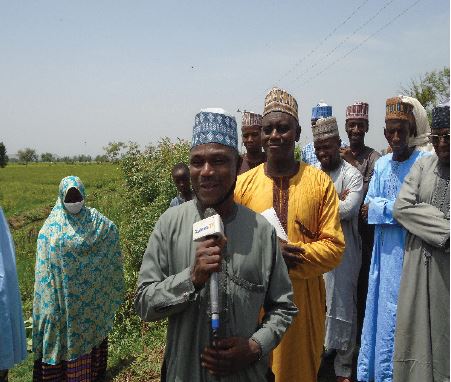
during Farmers’ Field Day
Mr. Qasim Abdulhafiz (Representative of National Agricultural Extension and Research Liaison Services (NAERLS), Ahmadu Bello University, Zaria – ABU), while speaking at the event, requested appreciated the innovative technology made by Premium Agrochemicals Limited, and requested the management of the company to make formal request to his organisation for mutually beneficial research cum business synergies. “Our job is to partner with any agro-based company in research, showcasing of products, business ties, as well as find possibilities of liaising with end users for patronage, and creating markets for such products if they meet our quality. All I would like the management of PAL to do is to write formally to us, requesting fort research and business collaborations,” Mr. Qasim concluded.
The representative of Premium Agrochemicals Limited (PAL) at the event, Mr. Musibau Wasiu, in his remarks, said, “In addition to the address of the Consultant to PAL (Professor Yakasai), in line with the Presidential order banning the importation of fertilizers and rice into the country, the management of Premium Agrochemicals Limited has constructed a very large fertilizer blending plant located in Lagos, Nigeria, where it currently blends and distributes three brands of highly scientific fertilizers, namely Magic NPK 20-10-10, Magic NPK 15-15-15, and Golden Grain 20-10-10. These fertilizers have many unique features, which give them a superlative status and leading edge over their counterparts – conventional ones. However, a few of them include the following:
they are applied not more than once on the farm for a particular farming season; they do not have any residual effects on soils, among others.” Similarly, he had unveiled the company’s plans to award scholarships to two indigenes of Kano (one female and one male) to study Agronomy at the Kano University of Science and Technology, Wudil (KUST). Likewise, it pledged automatic employment for the scholarship awardees upon successful completion of studies and graduation. Also, it pledged giving Kano State priority during its nationwide mass employment slated to hold later in the year.

Agric., KUST), during Farmers’ Field Day
Among the guests, special guests of honour and participants, who attended the occasion included
Alhaji Abubakar Tijjani Abubakar (District Head of Kura Local Government Area, Kano State);
Professor Yusuf Bala Daraja (Dean, Faculty of Agriculture, Kano University of Science and Technology, Wudil – KUST);
Professor AhmadShuaibu (Head of Department, Agricultural Economics and Extension, KUST);
Dr. Nasir Ahmad Abdulkadir (Head of Department, Soil Science, KUST);
Dr. Shamsu Ado (Department of Crop Production Technology, Audu Bako College of Agriculture, Danbatta – ABCOA);
Dr. Kabir Dawaki Dauda (Department of Crop Science, KUST);
Engr. Bello Abdul Saleh (Federal Ministry of Agriculture, Rural Development);
Alhaji Ibrahim Garba (Representative of Hon. Commissioner of Agriculture and Natural Resources, and
Deputy Governor of Kano State, His Excellency Dr. Nasir Yusuf Gawuna);
Alhaji Yakubu S. Rahama (Representative of Kano State Agricultural and Rural Development Authority – KANARDA);
Alhaji Idris Saidu Garko (Senior Thematic Coordinator, Crop Productive Enhancement, Sasakawa Global 2000/Sasakawa Africa Association);
Hajiya Rahamatu Sale (Women Leader, Kura Local Government Women Farmers’ Association);
Mallam Sani Danladi Yadakwari (Chairman, Tomato Farmers’ Association, Kano State Branch, and National Secretary, Tomato Farmers’ Association);
Mr. Musibau Wasiu (Representative of Premium Agrochemicals Limited – PAL);
Mr. Qasim Abdulhafiz (Representative of National Agricultural Extension and Research Liaison Services (NAERLS),
Ahmadu Bello University, Zaria – ABU);
Alkasim Mukhtar Tsoho (Field Officer, PAL),
Dr. Bashir (Representative, Centre for Dryland Agriculture, Bayero University, Kano – BUK), among others.
Congruently, the event was fully covered by the following public and private media outfits:
Abubakar Rimi Radio and Television (ARTV);
Radio Kano Broadcasting Corporation;
Rahma Television, and
Tardigrade Publishers (Tardigrade Magazine – Digital/ Online and Tardigrade Magazine – Prints).


